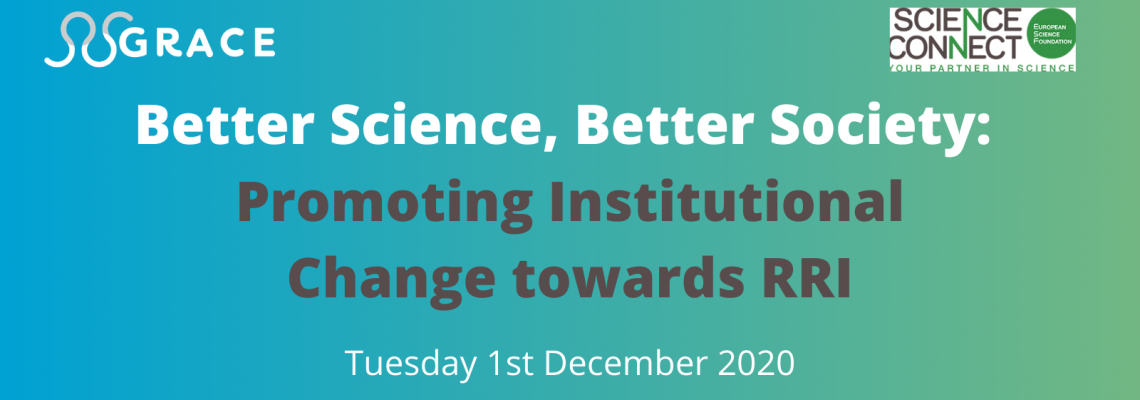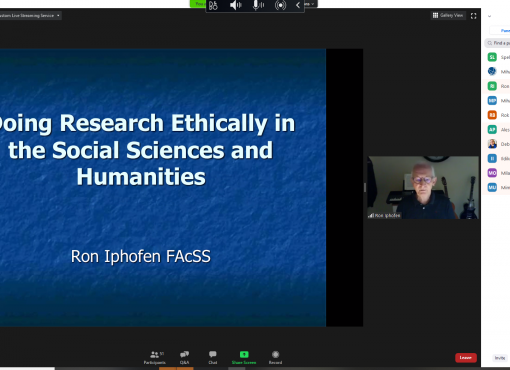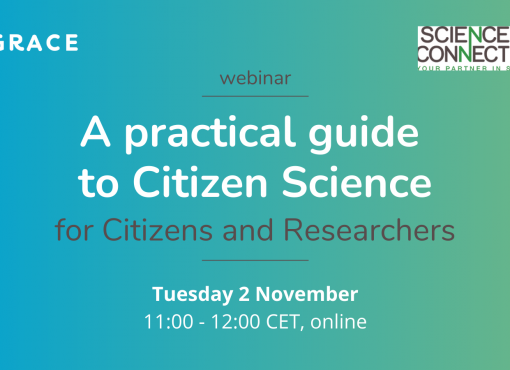
Better Science, Better Society: Promoting Institutional Change towards RRI
Tuesday 1st December 2020, 9:30 to 11:30 (CET), online
What actually is Responsible Research and Innovation? What are its potential benefits to research funding and performing institutions and to research and innovation ecosystems?
Join the European Science Foundation for this two-hour webinar and discover the ressources the GRACE project offers to pave the way to institutional change!
Experts on the field and organisations actively pursuing institutional change will be invited to share their views and experiences on the process, with a special focus and practical examples on Research Ethics and Integrity, and Gender Equality pillars.
The webinar will also provide insights into the new requirement of Gender Equality Plans (GEPs) for Horizon Europe projects.
AGENDA
09:30 – Greetings – Nicolas WALTER (ESF)
09:35 – Introduction to RRI and GRACE – Ildi IPOLYI (ESF)
09:40 – Concept of RRI and Institutional Change – Zoya DAMIANOVA (ARC Fund)
10:00 – ESF roadmaps towards Institutional change on RRI – Eugenia VILARCHAO (ESF)
10:15 – Q&A session
10:25 – Coffee Break
10:40 – Gender Equality actions in Europe – Maria SANGIULIANO (Smart Venice)
11:00 – Research ethics and Integrity – Jeanne MIFSUD BONNICI (RUG)
11.20 – Q&A session
SPEAKERS
Nicolas Walter is the Chief Executive Officer of the European Science Foundation. His background is in business management and innovation as well as space studies. N. Walter has been involved in many science policy initiatives in the domains of European marine, space, polar and materials science. He has also initiated and managed over 12 projects and studies financed by the European Commission and the European Space Agency; and started developing the ESF grant evaluation services in 2009. He joined ESF in 2002.
Ildiko Maria Ipolyi is a Science Officer at the European Science Foundation, leading the Science with and for Society Programme of organization. She is an experienced project coordinator and with specific interest and responsibility for the development of new activities at the organization. She is an experienced scientist with interdisciplinary background: MSC in food technology, PhD in analytical chemistry, extensive work experience on the field of environmental analytical chemistry, science-policy interfacing, network development and institutional change. Besides the GRACE, she is coordinating the TeRRItoria, CASPER and UniSAFE projects, participates in TIME4CS and WBC-RRI.NET, all funded under the Science with and for Society call of H2020 Framework Programme of the EC.
Zoya Damianova is the Programme Director of the Applied Research and Communications Fund (ARC Fund) and as such is in charge of the strategic development of the organisation and the expansion of its portfolio of studies and analyses in the domain of research and innovation policy. Her current thematic focus is on responsible research and innovation in research-performing organisations and in territorial development policies, sustainable innovation and sustainable development, responsible energy consumption in households, as well as technology assessment as a field of policy research and practice.
Marko Hajdinjak is a senior analyst at ARC Fund with 18 years of experience in participation in and management of international research projects. His current research work is mostly focused in the areas of Responsible Research and Innovation (RRI), social innovations, resource efficiency, green innovations, and social-cultural aspects of energy consumption and energy efficiency. He holds a MA degree in Nationalism Studies (Central European University, Budapest, Hungary) and a BA in Southeast European Studies and in Political Science and International Relations (American University in Bulgaria, Blagoevgrad, Bulgaria).
Eugenia Vilarchao is a Junior Science Officer working at the Science with and for Society programme at European Science Foundation. Owner of a PhD in Neurosciences, she has more than nine years of experience in academic research, scientific project development and management, publishing, and good knowledge of international science systems. At ESF she is currently project manager of the EU-funded SwafS project CASPER, coordinator of the implementation of GRACE, and member of TIME4CS. She participates at the Marie-Curie Alumni Association where she is actively involved in Responsible Research initiatives.
Maria Sangiuliano, PhD in Cognitive and Learning Studies, senior gender researcher, project manager and trainer, is Research Director and CEO at Smart Venice. Maria has 20 years of working experience in EU funded projects and programs on gender equality. Her research and work is located at the intersections between social and technological innovation and on diversity sensitive co-design and participatory design methods as tools that make innovation policies and processes more sustainable and inclusive. With Smart Venice, she is the gender expert in charge of supporting the H2020 CALIPER project partners in achieving institutional change for gender equality, after having had the same role within the EQUAL-IST project, and she is currently leading the Smart Venice team as partners in the GE Academy and CASPER consortia on the same issues. Linkedin Profile
INFORMATION
For further information please contact us! grace[at]esf.org

